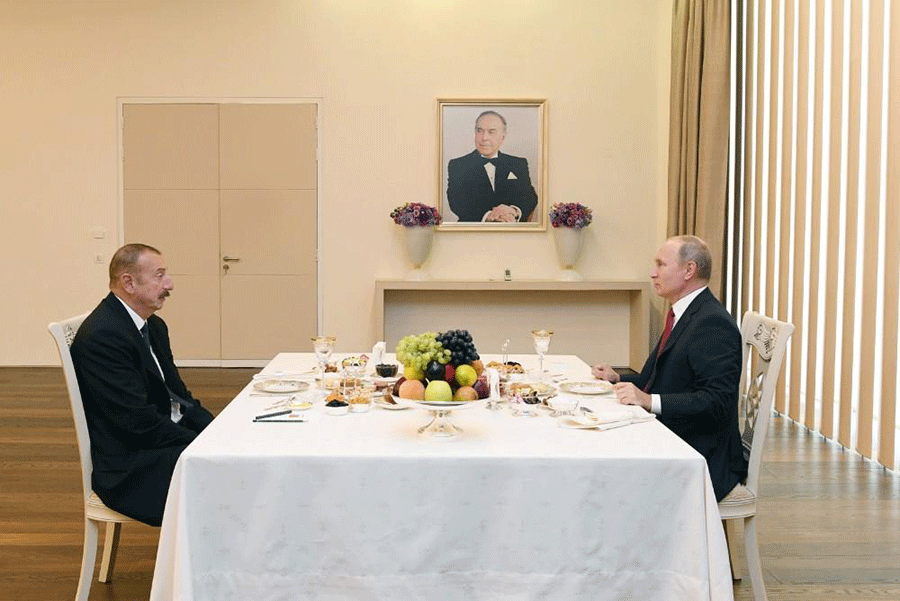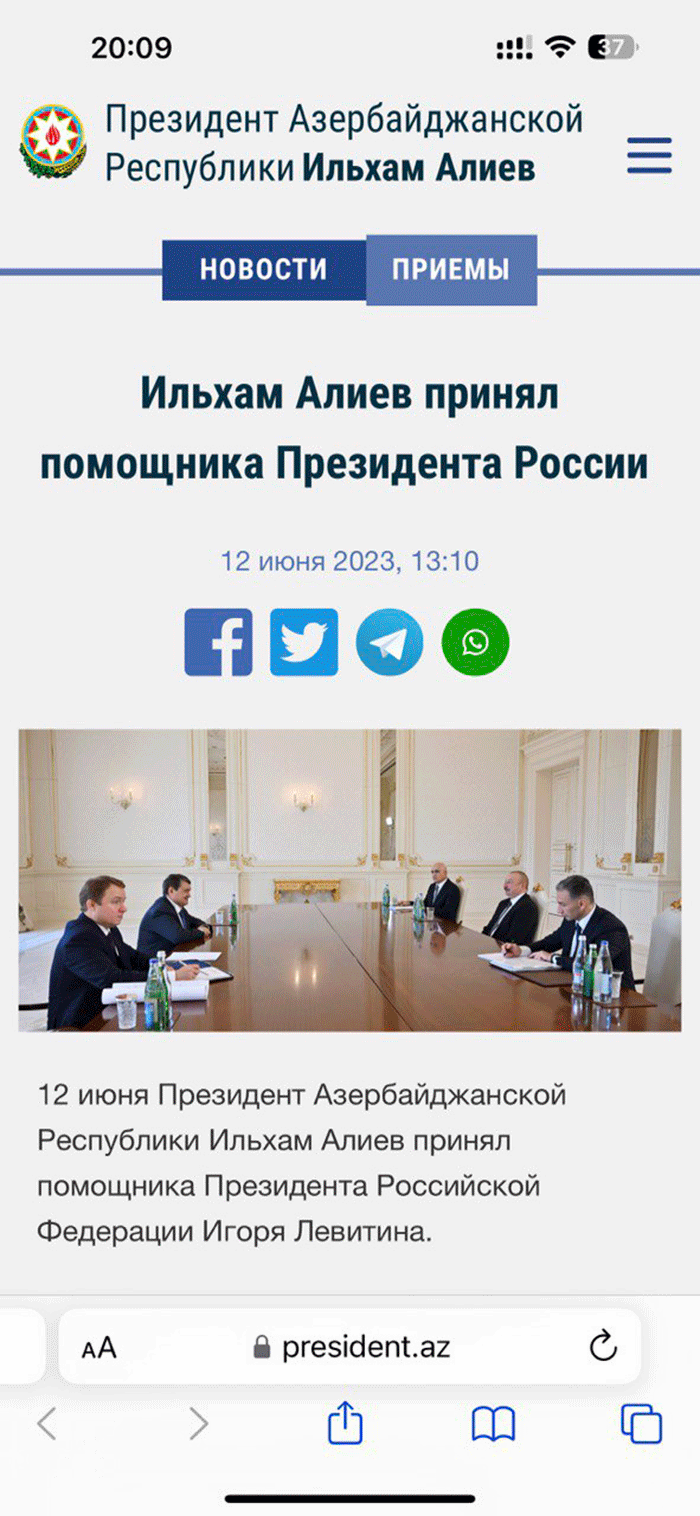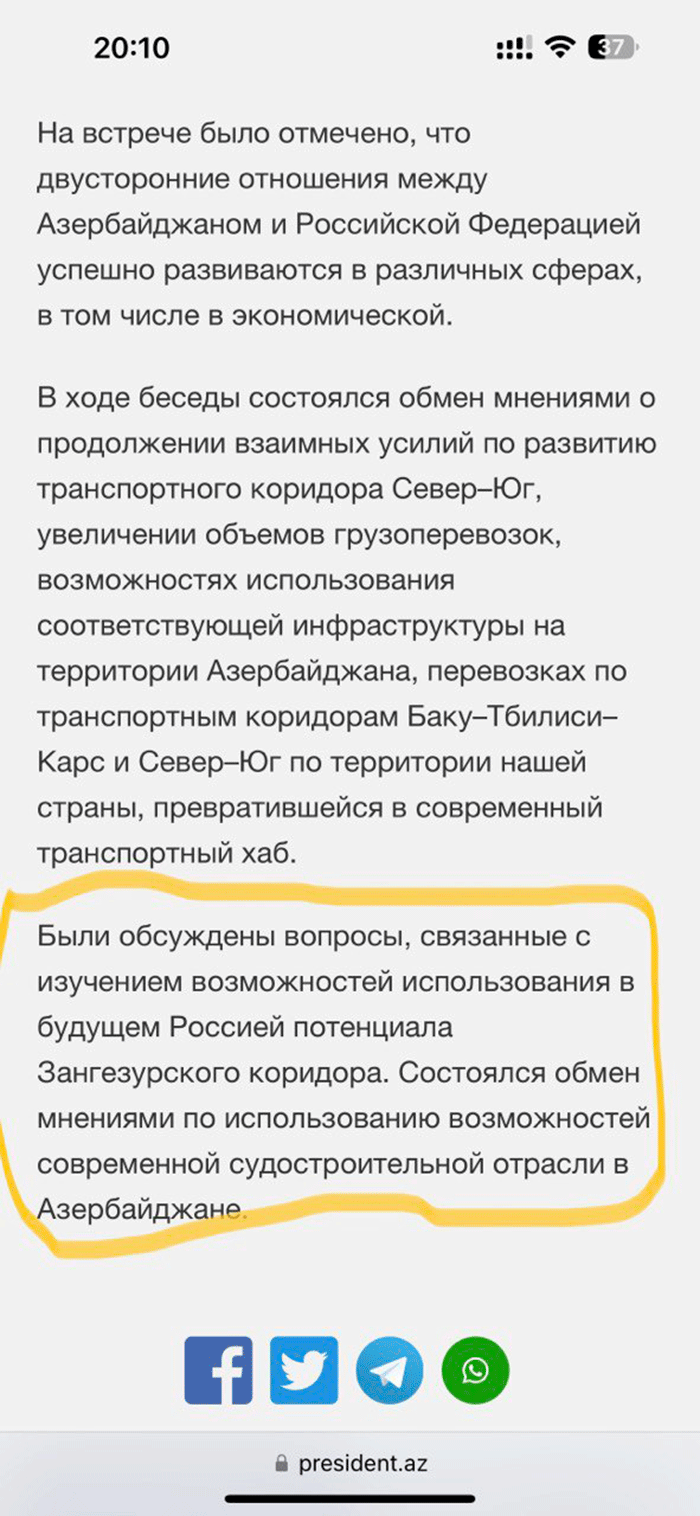Moscow and Baku are already officially discussing the possibilities of using the potential of the “Zangezur Corridor” by Russia
It has been almost two years since the Russian authorities announced at various levels that the West, particularly the EU, wants to take away the initiative of the Armenian-Azerbaijani settlement from Russia. Russian ambassadors officially made statements with this tone, deputy ministers of the Russian Foreign Ministry, and also at the level of the Russian Foreign Minister, as well as the spokesperson of the Russian Foreign Ministry several times a month.
Russian Deputy Foreign Minister Mikhail Galuzin made the latest fresh announcement. The Russian side will continue to make efforts aimed at improving Armenian-Azerbaijani relations and signing a peace treaty by the tripartite agreements, Galuzin said in a conversation with the correspondent of the Russian TV station “Russia-24”. He considered it quite natural and logical that Baku and Yerevan directly discuss the text of the peace treaty. According to him, the only road map for the settlement of the Armenian-Azerbaijani problem is the tripartite statement signed by Russian President Vladimir Putin, Azerbaijani President Ilham Aliyev, and Armenian Prime Minister Nikol Pashinyan on November 9, 2020.
Referring to the policy conducted by the United States in the Caucasus, Mikhail Galuzin said that “Washington is everywhere trying to achieve the same goal: to push Russia out and subjugate independent countries that are Russia’s partners and allies in a neo-colonial order, to hinder Russia’s partnership and alliance with its friends and neighbors.” He further added that Russia is not opposed to other states contributing to the normalization of relations between Azerbaijan and Armenia, “but not with words, but with deeds” and “following the fundamental agreements of the leaders of Russia, Azerbaijan, and Armenia.”
Read also
A situation is created when Russia’s public dissatisfaction with the West and the expectations of the Azerbaijani authorities from Armenia appears on one side of the scale. Based on Azerbaijan’s public complaints about both the deployment of the EU civilian mission in Armenia and the actions of France, it is evident that Baku avoids negotiations and possible agreements under the auspices of the West. Sometimes one even gets the impression that Moscow and Baku make statements through “transmissions” and take different steps. On June 9, Armenian Prime Minister Nikol Pashinyan and Russian President Vladimir Putin met in Sochi. Pashinyan unexpectedly spoke about Karabakh issues, noting that the humanitarian situation in Nagorno- Karabakh continues to tense.
“Today, we will also discuss bilateral agenda and regional issues. We will also discuss the situation in Nagorno- Karabakh, the area of responsibility of the Russian peacekeepers; unfortunately, the humanitarian situation there remains tense. There has been no gas and electricity in Nagorno-Karabakh for several months, and the situation in the Lachin Corridor continues to be quite tense. By the way, I must emphasize that now the supplies of food to Nagorno- Karabakh are carried out with the support of Russian peacekeepers; it is a limited amount of food. The humanitarian crisis in Nagorno-Karabakh continues, and it is also a fundamental issue, and I am sure we will discuss it today,” Pashinyan said.
During the public meeting, Pashinyan emphasized that the situation in Nagorno- Karabakh is one of the agenda topics to be discussed with Putin. Just one day after Pashinyan’s public statement, Azerbaijan organized a remarkable information leak, trying to “punish” Armenia for raising the Nagorno-Karabakh issue publicly again during a high-level Armenian-Russian meeting.
According to the tripartite statement of November 9, 2020, to organize the unimpeded movement of citizens, vehicles, and cargo, the bodies of the Border Guard Service of the Russian Federation will carry out control, said the Deputy Prime Minister of Azerbaijan Shahin Mustafayev in a conversation with the “Moscow-Baku” periodical, answering the question whether Russia will carry out control, regarding transport communication between the western regions of the Republic of Azerbaijan and the Autonomous Republic of Nakhichevan.
Shahin Mustafaev clarified. “Negotiations are underway based on point 9 of the November 9, 2020, joint statement to implement its provisions as soon as possible. It is planned to restore the existing and new transport links connecting Nakhichevan with Azerbaijan’s western regions. Both passenger transportation and cargo transportation will be provided.” Then he added that, at the moment, discussions are going on to agree on the technical details of this matter.
Reminder: On June 2, the regular session of the tripartite working group on unblocking communications in the South Caucasus region was held in Moscow with the participation of the deputy prime ministers of Azerbaijan, Armenia, and Russia.
Official Yerevan immediately responded to Shahin Mustafaev’s statement on the same day. The office of the Deputy Prime Minister of Armenia, Mher Grigoryan, referring to the information of the Deputy Prime Minister of Azerbaijan that the border guards of the Federal Security Service of Russia will guard the communication routes leading to Nakhichevan on the territory of Armenia, responded to Armenpress’s inquiry.
“During the tripartite working group discussions, including the last meeting, no such agreement was reached. Armenia’s position has been and continues to be that the roads provided for in point 9 of the tripartite declaration of November 9, 2020, shall operate under the sovereignty and jurisdiction of the parties, on the principle of reciprocity.”
That seemed to close the topic. But no, official Baku continued to develop the topic, opening remarkable parentheses։ On June 12, the President of Azerbaijan Ilham Aliyev received the Aide to the President of the Russian Federation, Igor Levitin, the Azerbaijani media reported, while recalling Levitin’s statement of June 9 that “Because of Western sanctions, global logistics are expanding to Asian countries.”
Then, regarding the same meeting, the office of the President of Azerbaijan published an official message, from which it became known that the “Zangezur Corridor” issue was on the agenda of the Aliyev-Levit negotiations.
First of all, the staff of the President of Azerbaijan informs that at the meeting mentioned above, it was noted that the bilateral relations between Azerbaijan and the Russian Federation are successfully developing in various fields, including economic ones. “During the conversation, ideas were exchanged regarding the continuation of mutual efforts in the direction of the development of the North-South transport corridor, increasing the volume of cargo transportation, the possibilities of using relevant infrastructures in the territory of Azerbaijan, and transportation,” the official message said. We are also informed that the issue of transportation through the Baku-Tbilisi-Kars transport corridor, which has “become a modern transport hub” was discussed.
Then, most notably, the message says: “Issues related to studying the possibilities of using the potential of the Zangezur Corridor in the future by Russia were discussed.” Spreading this official message, the Azerbaijani news media, in turn, add: The “Zangezur Corridor is a 40 km long transport corridor project. This route is planned to be implemented in order to establish transport connections between the western regions of Azerbaijan and the Autonomous Republic of Nakhichevan. Thus, a direct land route from Turkey to Azerbaijan is formed…”
Thus, Moscow and Baku are not only discussing the topic of the “Zangezur Corridor,” but also the possibilities of using the potential of this “corridor” by Russia in the future are on the agenda of Russian-Azerbaijani negotiations.
And the political summer in Armenia is peaceful. Such “minor” topics are not fashionable for the Armenian parliamentary opposition and extra-parliamentary groups. They were trained to ask exclusively such questions as: “What are European observers doing in Armenia?”, “The West is trying to push Russia out of the South Caucasus,” or “The West is interested in the Zangezur Corridor.”
Emma GABRIELYAN
“Aravot” daily, 14.06.2023





















































